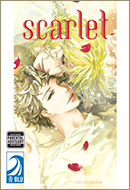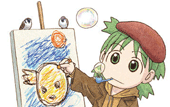   |
Manga-ka: Takashi Kanzaki
Publisher: June
Rating: Mature (18+)
Released: January 2009
Synopsis: “Kou is staying at the dorm of Seiran Academy High School to prevent himself from acting on his love for his sweet and meet stepbrother Naruki. But Naruki follows him to Seiran! Now, Kou has to protect Naruki not only from himself, but from other students who want to have innocent Naruki for themselves. Enter Yoshino, Kou’s roommate, with his brilliant plan – hypnotize Naruki into becoming someone who can defend himself. Kou reluctantly agrees, but the result blows his mind! Now, every time Naruki is aroused, he develops a split personality – seme-Naruki, who will take any chance to top anyone, but most especially Kou!”
Double Trouble is a comedic tale of boys’ love that plays almost entirely on the idea that guys never have anything but sex on the brains. I’ll leave the validity of the statement alone, but at least say that it’s a focus that works well in the book’s favour. Cue the mild incest and love triangles!
Kou is a young university student who’s left home to live in his school’s dorms but not out of pure commuter convenience. At home is Naruki, his stepbrother, for whom Kou is madly in love with. Fearful that he’d jump his ‘brother’, Kou decided to leave home. Fate has other things in store for him however when Naruki arrives at his school, fully enrolled and happy to be close to his new brother yet again, though of course not in the way Kou would like.
It soon becomes apparent that it’s not just Kou who has his eyes on Naruki, as various students at the all-boys’ school step up to make their advances on the innocently ignorant transfer student. Fearful of his brother’s sexual safety, Kou enlists the help of his best friend and roommate, Yoshino, to hypnotize Nuruki so that he can protect himself. Now every time Nuruki becomes aroused, he turns into seme-Nuruki; a cool and confident version of himself that won’t disappear until he’s fully satisfied. Yet now instead of worried, Kou is jealous, as Nuruki’s reign of sleeping-around begins, even though his original self remains completely unaware.
While the split-personality side of the story was a neat little quirk, the character dynamics of Kou and Yoshino were what really won me over to this odd little story. Yoshino, subtly at first, rose past the role of helping-friend and took up arms, so to speak, in the fight for Kou’s heart. He orchestrates almost everything that happens in this book as he plays Kou like a proverbial-fiddle, predicting his reactions and setting the stage for his own hopeful ascension to Kou’s object of affection. Meanwhile Kou, so bent on winning the body of Nuruki, is at constant odds with his own pride as he reluctantly comes to terms with the fact that he may not be the automatic-top in bed that he had envisioned.
Nuruki as a seme did prove to be a chuckle-worthy wrench to throw into Kou’s fantasies and Kou finds himself repeatedly on the literal receiving end of Nuruki’s forward attention, despite his best efforts. By the time the end of the book comes around, the story is no longer about the pursuit of Nuruki, but about the pursuit of Kou, and not by one, but by two possible suitors. Through the entire story, Takashi Kanzaki avoids nearly all of the romantic-pitfall of boys’ love stories by keeping the focus of the characters entirely on the physical aspect of their attraction to one another. There’s no talk of dating, no weepy rejections and no blushing confessions, just a group of guys who see the ass they want and don’t want to share.
At the book’s end there is also a one-shot story that, while taking place in the same school, is separate from the title story. More linear in story-telling fashion, it follows the student proclaimed “homo-making machine” of the school as he struggles with the feelings he holds for his closest friend and seemingly most uninterested party. I didn’t enjoy this one as much as its predecessor but its mildly darker tone did make for an interesting change of pace.
Double Trouble was a fun read with some surprising little twists and lots of amusing pokes at boys’ love stereotypes. Digital Manga also did a nice job handling the material, from a colourful logo design to a tidy handling of the text inside, an it always helps when the publication work is in favour of the material. While I still find Takashi Kanzaki’s work lacks a certain something, with her stories often feeling a little flat despite all their merit, there was still enough entertainment here in this quirky little one shot to earn from me a thumbs up. For characters that rise past their stereotyped roles, and give them the finger on the way by, Double Trouble earns its way to my bookshelf with comedic charm.
Review written March 1, 2009 by Lissa Pattillo
Book provided by Digital Manga for review purposes


 Follow
Follow
























[…] Media Network) Casey Brienza on vols. 1-3 of Dororo (Anime News Network) Lissa Pattillo on Double Trouble (Kuriousity) Eric Fredriksen on vol. 11 of Eden: It’s an Endless World (Advanced Media […]